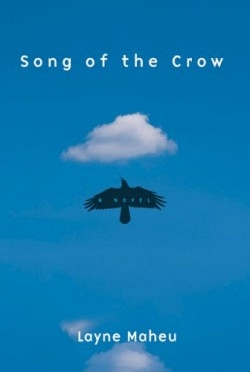Song of the Crow
“I remember the nest that hatched me,” begins this gentle, powerful debut novel, setting up the quiet power that will tremble throughout the work. “My mother lined it carefully with the fleece of human and sheep, mane of horse, down of dogwood, but mostly the fray of twigs and grasses.”
Like a fable written by a poet, the story is a simple one, yet its profundity adds layers of complexity that shift, bringing in religion, nature, and morality. Told from the point of view of a crow, the tale begins with the baby bird gazing down at the head of Noah, and feeling the forest shake as the ark builder chops trees to construct his boat.
As the stone ax rises and falls, creating panic in the nest, the crow knows that a change is coming, that what was once a natural rhythm has become staccato, heightened by the sense of bad tidings with every downed tree.
Known as “Keeyaw the Terrible” by the birds, Noah pauses in his task to give a burnt offering to God, but only the birds see the deity fly in silently, between the branches, and land high in the trees. As Noah prays, unaware of God just above him but strong in his faith, the man’s frustration and fear become apparent. “Is it too late to pick someone else?” he asks into the trees. “I never asked to save anything in the first place.”
Kneeling in the forest, fearful that God isn’t listening, Noah has only begun to face his difficulties. He must weather the people who come to the ark, pleading and shouting for their place on the boat, only to be turned away. Finally, as the rains increase, he must abandon the world he once knew and turn again to his faith as the ark begins its journey.
The crow, hiding in the beams, watches the “beastmen” who feed the animals, and marvels at the rising seas with its waves that move “like a thousand clipped, tiny mouths snapping up at the air.” As the rain ends and the skies clear, the windows of the ark are opened to clear the “animal reek of sweat and urine lifting with the steam from the saltwater.”
With every description, the author’s sentences seem less like carefully arranged language and more like wisps of smoke and dream; he twirls words and images into an ethereal whole that both captures the mystery of nature and brings the reader inside of it. This is an ancient place, lyrically rendered, untouched by the quick-moving, techno-driven drone of the modern day.
In trying to cup his hands around the fluidity of his crow’s thoughts, Maheu has attempted a larger feat—creating a timeless world, one in which there is only instinct, dread, curiosity, joy, and observation. Although this might apply to animals, it certainly also applies to humans, stripping away the seemingly superfluous parts of modern life to examine what lies at the core of each person. Noah acts on faith, but also on instinct, trusting what he knows to be right. Even when he questions whether he’s the one who should have been chosen for this task, his doubts are only on the surface, floating momentarily across the solidity of his convictions.
Telling the story of Noah from the crow’s point of view does more than give Maheu an opportunity to display his keen, finely honed sense of language. It also forms a backdrop for exploring larger issues that have permeated the world for centuries, and will continue to leave men—and perhaps crows—musing for centuries more. What is each creature’s place within nature? How does one show respect for the ancient truths while creating one’s own truths, both among others and for oneself? What, ultimately, is faith?
Far from being the gentle, sweet creatures of Sunday school lessons, the inhabitants of this ark suffer and fight, cling to each other sometimes, and other moments push themselves away from each other in anger or indignation. They must wrangle not just with the changes to their external environment, to seas rising and a muddy paradise beyond, but to their internal shifts as well. When the world changes completely, how can a heart and its beliefs not change with it?
Maheu, who works as a carpenter in Seattle, leaves it to readers to craft their own conclusions, providing only the lyrical ark. Instead of making his Noah and crow into philosophy-spouting inventions, the author builds a tale both majestic and humble, like a tiny chapel that hums with the devotion within.
Disclosure: This article is not an endorsement, but a review. The publisher of this book provided free copies of the book to have their book reviewed by a professional reviewer. No fee was paid by the publisher for this review. Foreword Reviews only recommends books that we love. Foreword Magazine, Inc. is disclosing this in accordance with the Federal Trade Commission’s 16 CFR, Part 255.

